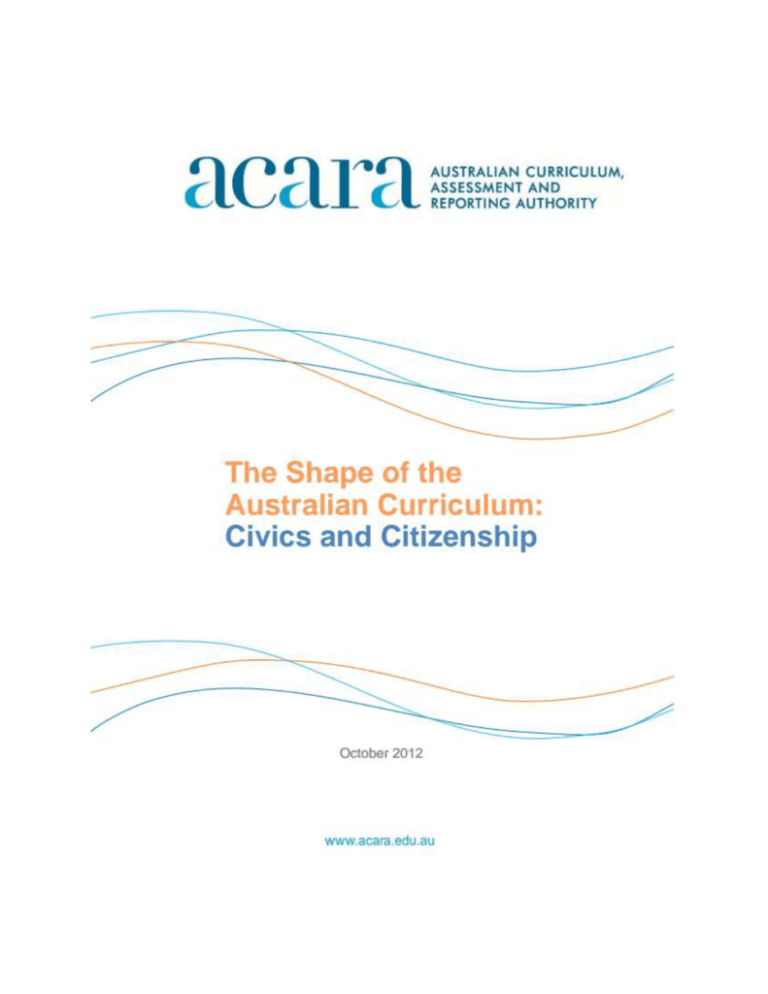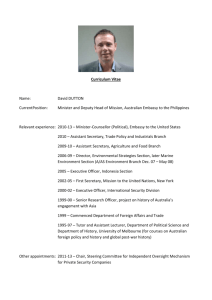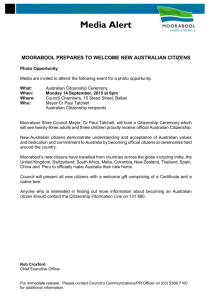
The Shape of the Australian
Curriculum: Civics and
Citizenship
October 2012
www.acara.edu.au
© Australian Curriculum, Assessment and Reporting Authority 2012 This work is copyright. You
may download, display, print and reproduce this material in unaltered form only (retaining this
notice) for your personal, non- commercial use or use within your organisation. All other rights
are reserved. Requests and inquiries concerning reproduction and rights should be addressed
to: ACARA Copyright Administration, ACARA Level 10, 255 Pitt Street Sydney NSW 2000
Contents
Purpose 1 Defining Civics and Citizenship 2 Context 3 Informing Principles 5 Rationale
6 Aims 7 Organisation of the Civics and Citizenship curriculum 8 Learners and
Learning: F-12 11 Overview 11 Years 3–4 12 Years 5–6 13 Years 7–10 13 Senior
Secondary 14 Civics and Citizenship and the cross-curriculum priorities 15 Aboriginal
and Torres Strait Islander histories and cultures 15 Sustainability 15 Asia and
Australia’s engagement with Asia 15 Civics and Citizenship and general capabilities 17
Critical and creative thinking 17 Personal and social capability 17 Ethical behaviour 18
Intercultural understanding 19 Literacy 19 Numeracy 19 Information and communication
technology (ICT) competence 20 Links to other learning areas and subjects 21
Conclusion 22 Key Terms and Definitions 23 References 25
Purpose
1. The Shape of the Australian Curriculum: Civics and Citizenship provides broad
direction on the purpose, structure and organisation of an Australian curriculum for
Civics and Citizenship. It is intended to guide the writing of the Foundation to Year 12
Australian Curriculum: Civics and Citizenship.
2. This paper has been prepared following analysis of consultation feedback on the
Civics
and Citizenship Curriculum Initial Advice Paper (2012) and ACARA Board advice.
3. The paper should be read in conjunction with The Shape of the Australian Curriculum
v3.0 available at
http://www.acara.edu.au/verve/_resources/The_Shape_of_the_Australian_Curriculum_
V 3.pdf
Informing principles
1
Defining Civics and Citizenship
4. a) Civics is defined broadly as an identifiable body of knowledge, skills and
understandings relating to the organisation and working of society, including Australia’s
federal system of government, political and social heritage, democratic processes,
public administration and judicial system; that includes local, state, national, regional
and global perspectives.
b) Citizenship can be formally defined as the legal relationship between an individual
and a state. More broadly, citizenship is the condition of belonging to social, religious,
political or community groups, locally, nationally and globally. Being part of a group
carries with it a sense of belonging or identity which includes rights and responsibilities,
duties and privileges. These are guided by the agreed values and mutual obligations
required for active participation in the group. In the Australian Curriculum citizenship
incorporates three components – civil (rights and responsibilities), political (participation
and representation) and social (social values, identity and community involvement).
Informing principles
2
Context
5. Civics and citizenship education is premised on the propositions that each student
can
learn and that the needs of every student are important. The Civics and Citizenship
curriculum will allow for inclusive teaching practices that take account of the abilities of
all students and respect the diverse range of students in Australian schools. This is a
key proposition of The Shape of the Australian Curriculum, V3.0.
6. Civics and Citizenship education is uniquely positioned to provide opportunities for
young Australians to become active and informed citizens in a global context. It
presents exciting and challenging opportunities for school authorities, schools and
teachers to prepare students for citizenship, both as part of the formal school curriculum
and as part of a wider whole- school program. This could include participation in
experiences external to the school but linked to the school curriculum (for example,
community activities, parliamentary education programs, civic institution visits and
electoral commission programs). Over the past two decades in Australia and
internationally, there has been a broadening of the concepts, processes, and practices
in Civics and Citizenship education. In particular there has been an increased emphasis
on the role of active citizenship, both as explicit content and as a key outcome of Civics
and Citizenship education.
7. Civics and Citizenship education in schools helps citizens to participate in and sustain
their
democracy. The link between schooling, citizenship and democracy is enshrined in
every set of Australian education goals, most recently in Goal 2 of the Melbourne
Declaration on Educational Goals for Young Australia (MCEEDYA, 2008), which states
that all young Australians should become active and informed citizens [who]:
▪ act with moral and ethical integrity
▪ appreciate Australia’s social, cultural, linguistic and religious diversity, and have an
understanding of Australia’s system of government, history and culture
▪ understand and acknowledge the value of Indigenous cultures and possess the
knowledge, skills and understanding to contribute to, and benefit from, reconciliation
between Indigenous and non-Indigenous Australians
▪ are committed to national values of democracy, equity and justice, and participate in
Australia’s civic life
▪ are able to relate to and communicate across cultures, especially the cultures and
countries of Asia
▪ work for the common good, in particular sustaining and improving natural and social
environments
▪ are responsible global and local citizens.
Informing principles
3
Context
8. As an identified subject, the Australian Curriculum: Civics and Citizenship will
contribute to achieving the educational goals identified in the Melbourne Declaration on
Educational Goals for Young Australians (2008, pp. 8-9) and will set out what young
people need to learn and be able to do in order to become active and informed citizens
in Australia and globally. It will do this by specifying content descriptions and
achievement standards, guided by a rationale and a set of aims. In delivering the
Australian Curriculum: Civics and Citizenship, education authorities, schools and
teachers will decide on the most appropriate organisational approaches and pedagogy
to achieve these aims.
9. Since 2004 there has been a National Assessment Program (NAP) for Civics and
Citizenship in Years 6 and 10, at three yearly intervals (2004, 2007 and 2010). Data
sets from the NAP sample for Civics and Citizenship will provide a useful reference
point for developing a progression in knowledge, understanding and skills, across the
relevant years of schooling for Civics and Citizenship.
Informing principles
4
Informing Principles
10. The principles that will inform the Australian Curriculum: Civics and Citizenship
include
the following:
a) Democracy in Australia involves a constitution, a well-established representative
parliamentary process based upon the Westminster system and a constitutional
monarchy. It is grounded in liberal democratic values and a belief in civic engagement.
If Australian citizens are committed to and participate in civic life, our democracy will be
sustained and strengthened.
b) The values on which Australia’s democracy is based include freedom of the
individual,
government by the people through a representative parliament, free and fair elections,
the rule of law, equality of all before the law, social justice and equality, respect for
diversity and difference, freedom of speech and religion, lawful dissent, respect for
human rights, support for the common good, and acceptance of the rights and
responsibilities of citizenship.
c) Australia is a multicultural, secular society with a multi-faith population. Young people
are members of diverse local, national and global communities, and need opportunities
to understand and participate in Australia’s multicultural and multi-faith society.
d) Citizenship contributes to the concepts of individual identity and a sense of
belonging.
Individuals may identify with multiple ‘citizenships’ at any one point in time and over a
period of time. Citizenship means different things to people at different times and
depending on personal perspectives, their social situation and where they live. This is
reflected in multiple perspectives of citizenship that reflect personal, social, spatial and
temporal dimensions of citizenship. The preparation of active and empowered citizens
includes opportunities for students to apply democratic principles, practise behaviours
and to actively engage in practical citizenship activities within schools, in the community
and online.
e) Student experience of Civics and Citizenship should be based on the formal
curriculum in Civics and Citizenship and a combination of class-based activities, wholeschool activities and community activities.
f) Students in schools are citizens but they need opportunities to build their knowledge
and
understanding and experience to become active adult citizens. The school plays an
essential role in the provision of opportunities for preparing active and informed citizens
to ensure the continuation of Australia’s parliamentary, liberal democracy.
g) Participation of citizens takes place at many levels – within the home/family, classes,
within schools, within workplaces, within communities, within our nation and
internationally. To be effective, citizens require knowledge and understanding of the
rights and responsibilities of citizenship, of the political and legal institutions and
processes and of the principles and values that underpin Australian democracy. They
also need the associated and necessary supporting skills, values, attitudes and
dispositions to become active citizens who can participate in communities at local, state,
national, regional and increasingly the global level.
Informing principles
5
Rationale
11. The Australian Curriculum: Civics and Citizenship will provide essential learning for
young Australians to be active, informed citizens in their democracy and an increasingly
interconnected world. To achieve this, the Civics and Citizenship curriculum will focus
on developing knowledge and understanding, and skills — underpinned by values,
attitudes and dispositions to participate in civic life, locally, nationally and globally.
12. The key knowledge, understandings and skills in the Australian Curriculum: Civics
and
Citizenship can be taught in a range of different contexts. This will provide flexibility and
choice for teachers and schools based on local school and community contexts, local
civics learning opportunities and available resources. Using a context-based approach
will assist in linking Civics and Citizenship learning with other learning areas and
subjects but requires rigorous consideration of essential content and appropriate
contexts.
13. The Australian Curriculum: Civics and Citizenship will provide opportunities for the
recognition of Australia’s first peoples and for students to develop awareness and
understanding of the diverse society in which they live. It will also help students develop
inclusive attitudes and beliefs and liberal democratic values and challenge stereotypes
based on difference. This is in the context of Australia as a multicultural, secular, and
multi-faith society, governed through a well-established representative parliamentary
process and based on liberal democratic laws, values, principles and practices.
14. The Australian Curriculum: Civics and Citizenship has been written on the
assumption
that links between students and local, state, national, regional and global communities
will be consolidated and strengthened through a whole school approach. Wider-school
programs will provide opportunities for students to engage with communities and civic
institutions. This could include students actively participating in community decisionmaking or contributing to civil society through, for example:
a) engagement with community service programs, fundraising for charities and
volunteer work
b) broader community projects including working with national and international
NGOs.
15. As an international citizen, Australia has commitments to United Nations
conventions, including human rights declarations and international obligations. An
awareness of the political and legal systems of other countries enhances students’
understanding of their own system of government.
16. The key to Australia’s representative, responsible and accountable democracy is
informed citizens who actively take part in their community in the context of liberal
democratic values, institutions and systems of government. If Australian citizens are
committed to and participate in civic life, our liberal, representative democracy, built on
a constitution and the supremacy of parliament, will be sustained and thrive.
6
Aims
17. An Australian Curriculum: Civics and Citizenship will contribute to the general
educational aims set out in The Shape of the Australian Curriculum v3.0. Its principal
task is to assist students to develop the civic knowledge, understanding and skills to
enable them to engage purposefully as citizens at local, state, national, regional and
global levels now and in the future.
18. An Australian Curriculum: Civics and Citizenship will:
a) develop the knowledge, understanding and skills that will facilitate the development
of the attitudes, values and dispositions students need to fully participate in civic life as
active citizens in their communities, the nation, regionally and globally
b) develop knowledge and understanding of Australia's liberal, representative
democracy, legal system and civic life, including reference to Australia’s democratic
heritage
c) develop a critical appreciation of the rights and responsibilities of citizenship and
civic life nationally and globally, including the capacity to act as informed and
responsible citizens and to critically examine values and principles that underpin
Australia’s liberal democracy
d) build an understanding and critical appreciation of Australia as a multicultural and
multi-faith society and a commitment to human rights and intercultural understandings,
with particular consideration of Aboriginal Peoples’ and Torres Strait Islander Peoples’
experience of, participation in and contribution to Australian civic identity and society.
7








